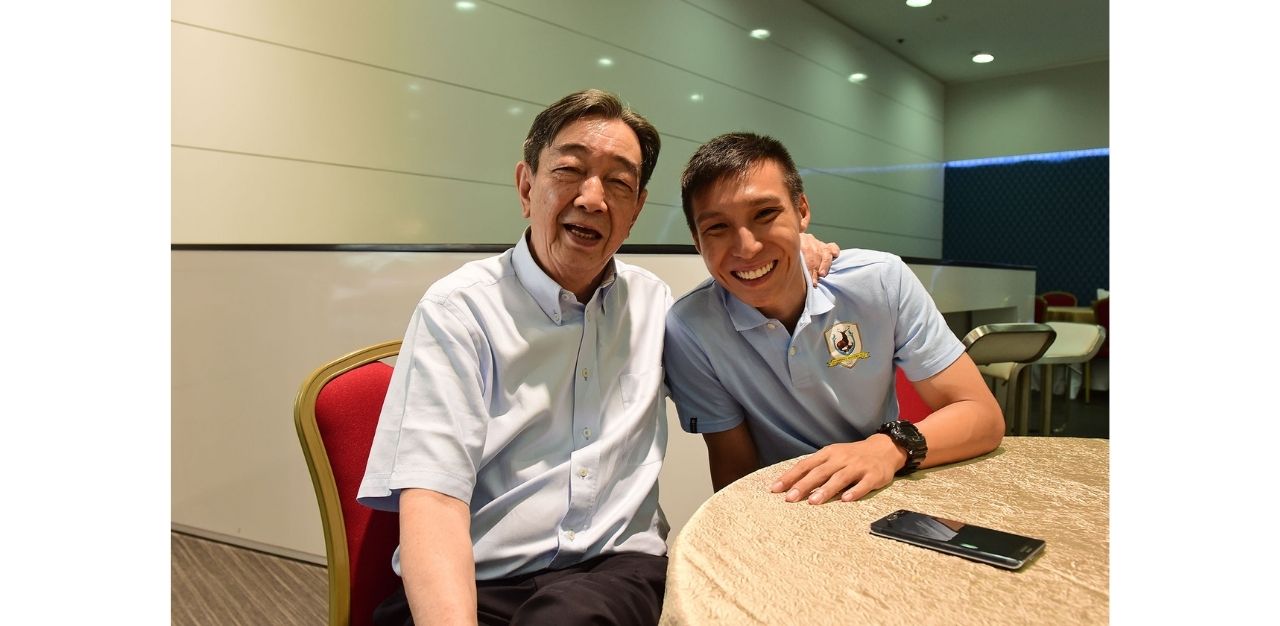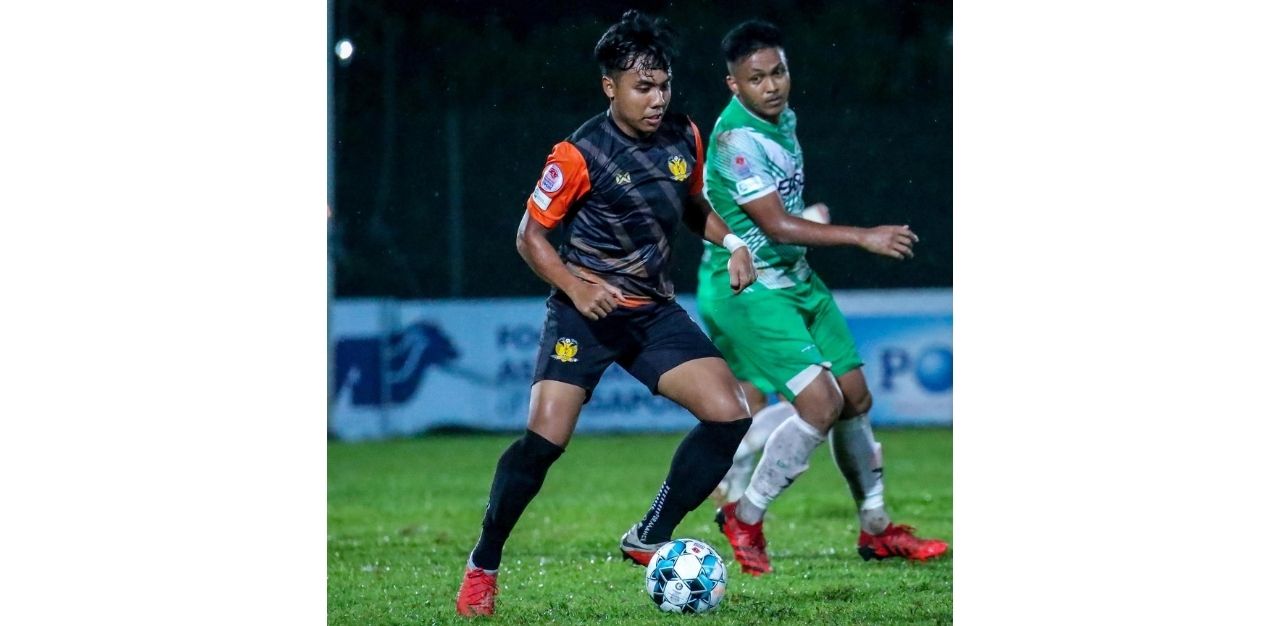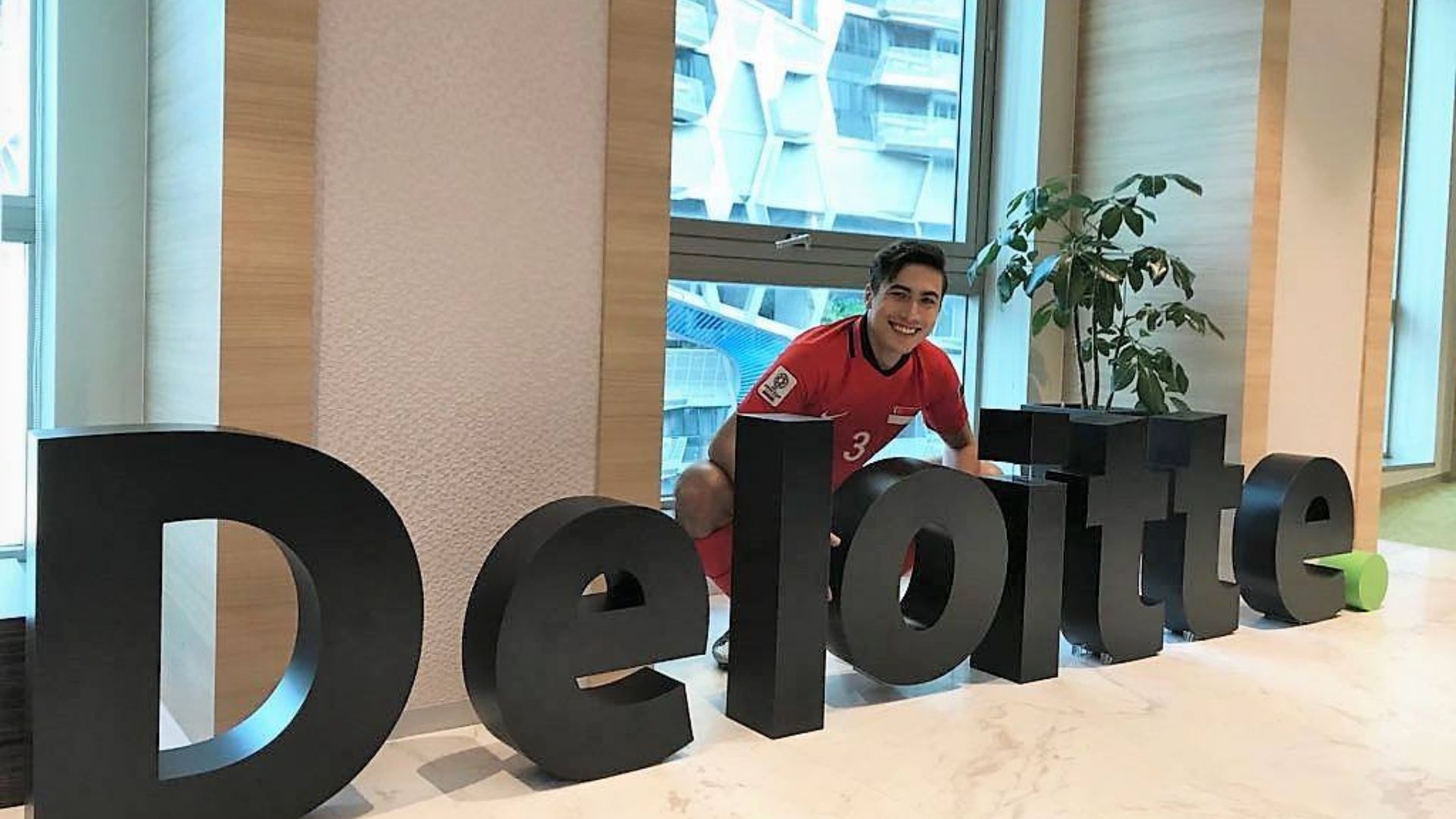In the recently-concluded 2021 Singapore Premier League (SPL) season, Hougang United caught the eye with their attacking verve as they netted an impressive 48 goals in 21 matches to record a joint league-best finish at third place.
They were no slouches at the back either as they recorded the league’s third-best defensive record of the campaign. Integral to their defensive solidity was centre-back Anders Aplin, who has started in 10 of his 14 league appearances this season.
The twice-capped defender has established himself a league mainstay since his entry into professional football with Geylang International at the age of 25 in 2016 after graduating from the Nanyang Technological University.
Part of the pioneer batch of student-athletes at the Singapore Sports School, Aplin was a bronze medal winner with the men’s football team in the 2016 Asean University Games on home soil.
While many see him as a tough, uncompromising defender on the pitch, few might know of his off-pitch involvement with the Singapore office of global accounting and professional services giants Deloitte.
Flexi-work Scheme: Gaining work experience while playing professionally
Armed with a business degree, Aplin was keen to apply what he had learned into practice in the marketplace. At the same time, he did not want to jeopradise his budding professional playing career.
He joined Deloitte Singapore’s Sports Business Group under the Deloitte Ignite’s flexi-work scheme between 2016 and 2018, where his brief was to provide research on sports and deliver benchmark analysis against international standards.

The Ignite scheme, which was inaugurated in 2014, helps national athletes from several sports to gain employment in the company without compromising on their sporting dreams. To date, more than 110 sportspeople have been employed in full-time and flexi-work roles.
Overseeing the programme is James Walton, who is a Sports Business Leader for Deloitte Singapore and Southeast Asia and has been based in Singapore since 2010.
Football is in the minority representation among the athletes employed at Deloitte Singapore. While a handful of players from the national women’s football team are in their payroll, former LionsXII, Young Lions and Balestier Khalsa forward Syafiq Zainal is the sole employee from men’s football.
Walton acknowledges the demands on men’s professional football in Singapore makes it challenging for any prospective player to seek full-time work in other industries.
“Football is actually one of the more difficult sports (in terms of balancing work and play) for a couple of reasons,” he says.
“First, on the men’s side, the sport is actually professional in Singapore. Male footballers have income from football.
“Secondly because of the fact that they are professional, training happens during the day. They train in the morning and afternoon, which is not entirely conducive to holding down a job.
“Anders is keen to have something on his CV and to gain some work experience so that he doesn’t go from having a degree to doing nothing.”
The 44-year-old British partner explains how male footballers in Aplin and former national goalkeeper Jasper Chan have sought meaningful employment at Deloitte without compromising on their full-time on-field commitments.
“We build that flexibility into their roles, they can plan (their work) around their training within their jobs. The work is not time-sensitive, so we can do it around their training,” he adds.
“He will be given a portfolio of work and be told, ‘This is the work for the week. It’s 20 hours’ worth of work.’
“That means he is working 20 hours a week, it is up to him what those hours are, if he wants to do it in between or after training. Whether you do it on Monday morning or Thursday afternoon, it doesn’t matter as long as you turn it in (at the end of the week).”
The intention of having flexible working schemes is to allow footballers to have the best of both worlds – building up a sporting career while also equipping them with relevant skills ahead of their post-playing days.
This includes having opportunities to work full-time at the company for short-term stints in the post-season.
“The kind of scheme we (Deloitte) have, where we work to create flexible working positions, and you look at how you can do short-term contracts on the full-time basis during the off season,” says Walton, who is also the Travel, Hospitality and Services Sector Leader in Deloitte Singapore.
“During the break, can they come in to work for a couple of months full-time? How you do flexible working arrangements and internships on a part-time basis during the rest of the time so that when they need to focus on football, they can focus on the football.
“And from a career point of view, they have a job where they are actually valued. The role they do has value, and they get treated as a normal employee.”
Certificates are insufficient without experience
Having the flex-work scheme as what Deloitte Singapore is offering to footballers in Aplin and Chan gives them a head-start in their post-playing career pathways.
Not many will be as fortunate as them in having such work experience before retiring from the pitch. Former footballers often find themselves thrown into the deep end once they hang up their boots.
A respectable polytechnic diploma or university degree as standalone educational qualifications does not provide an automatic route towards a new employment journey outside of football.
Despite taking on some relief teaching duties at St. Stephen’s School during his playing days, Syafiq found out the hard way during his job search when he quit football following the end of his playing contract with Balestier in 2016.

With help from the Sport Singapore’s Job Placement programme, he subsequently found employment with Deloitte Singapore in April 2017 and is now a senior executive at the Clients & Markets Section.
“As a former footballer, the most difficult part was the transition when I stopped playing at 27,” says the 30-year-old former forward.
“Other people around my age would already be competing with younger fresh graduates for jobs. While having a diploma is a good stepping stone and a safe bet for a career switch, I did not have any job experience while others are already armed with degrees and some working experience.”
Walton admits the limited career life-span in competitive sports sets footballers back in their post-football career plans and futures.
“A lot of athletes are mindful of the fact that their (sporting) careers can end at any point in time with an injury or anything else,” he says.
“In Singapore football terms, it is not that common to get a contract after 30 years old, which means you have a (short) shelf-life.
“Going into an office environment, you are effectively competing for jobs against fresh graduates. The danger is that, if you haven’t had any work experience at that point in time and when you are 30 years old, you may have a family with young children (but) with no work experience.
“At 30 years old, you will usually be a manager, but without work experience, you are (instead) paid at associate level.”
What’s worked in the past may not work in the modern world
While footballers are increasingly desiring to achieve an optimal balance between their present playing professions and future mid-to-long-term off-field career prospects, the current local football ecosystem is inadequate to address this conundrum with its financial and structural constraints.
For veteran football official Yakob Hashim, corporations can recreate the once-flourishing Inter-Business Houses Leagues of the 1970s and 1980s by taking over the beleaguered local professional clubs through privatisation, following in the footsteps of Sea Group-owned Lion City Sailors.
He believes having a benefactor who is willing to take care of the players’ welfare on and off the pitch can provide a win-win solution for the clubs and corporations.
“It’s down to a godfather taking care of the players,” says the 60-year-old former Football Association of Singapore (FAS) Council member.
“Last time, players didn’t have much salary. (Big companies such as) Guthrie hired all the national players.
“If I am (in charge of local telco giants) StarHub, I will hire the players to work for me, and at the same time I will tell them, ‘Ok, 1 o’clock you go and then you train.’
“If they don’t make it in football or get injured, at least StarHub will still give them a job in whatever they can do to support the company. They will already be trained in the jobs they will be taking when they are playing.”

Yakob believes having the corporates engaged in the local football ecosystem through privatisation can also rejuvenate domestic interest in the game as industry rivalries get played out on the pitch.
He adds, “After my election into the FAS Council in 2017, I told them, ‘Look, if we want to change the landscape of football, all the big corporates that have been earning big money from Singaporeans, why can’t the government get them to contribute by taking over local teams?’
“If you have SingTel versus StarHub, you think (of) the business rivalry, how will the atmosphere be? When you have big corporates and big rivalries like UOB versus DBS, it will only boil down to make things better for the SPL. That makes people think that there is a future for the footballers.”
For the noble intentions of enhancing player welfare and performance through this concept, Walton has reservations, citing it as “a short-term fix”.
“The first thing is, the companies that tend to do this tend to be state-owned companies. They can afford to make losses on the football team and chalk it up as an expense,” he explains.
“If it’s an entrepreneur-owned business, if you are Forrest Li (Singapore’s richest man and principal owner of the Sailors) and it’s your own money, you can use it as you like.
“A commercially-run company with shareholders will question why it should take on a football club in the current economic climate where it is difficult to make a profit. For the most part, it is a branding exercise but you will probably be making a loss. And for shareholders, that will be questionable when you can use that money in other areas.”
The Deloitte Singapore partner is more worried about the adversarial impact of the individual footballer’s post-playing career path if it is not being developed during his employment.
“The second problem with this scheme in that kind of arrangement, the jobs become token,” he cautions.
“It becomes, ‘Hey come work here.’ And they put the players in the mailroom, they put the players as admin assistants. They tell them, ‘Your job is to play football and don’t worry about everything else.’
“The person gets a bit better income, but when the person stops playing, has he gotten the experience? Has he had the learning and development? Has he been drilled the right way in his career?
“Is the business doing it for the right reasons to support them? The experience ends up being token employment, ultimately for the long-term it doesn’t bring a lot of benefit.”
Supportive employers who understand football and economy
While there are differing opinions on how to get the best out of the footballer’s playing and employment paths, what is undeniable is having supportive employers who understand the game and work demands equally can motivate players to give their best in both.
Yakob recalled how the support from the police force in his younger days allowed him to prosper as a national team goalkeeper on the pitch and a policeman off it.
“(During my playing days,) we had careers and our permanent jobs,” he says. “I was fortunate to be taken care of in the police force.
“I worked, went for training, played and had a monthly salary. (With the support,) the players would give 110 percent in the game.”
The veteran football coach laments how from his personal industry contacts, only FAS Vice-President and Executive Chairman of Komoco Holdings Teo Hock Seng has provided a similar level of support to players today.
When Teo was chairman of local professional club Tampines Rovers from 2003 to 2015, he provided employment opportunities for retired and present footballers at Komoco.

His legacy in hiring players has seen several prosper in the private local automotive company. Former league defender Yunos Samad is now a key management personnel while Hougang midfielder Fabian Kwok has shown himself to be an effective team player on and off the pitch.
“Uncle Hock Seng is the only one I know who is helping players to work in his company. Players like Noh Alam Shah are given jobs inside,” says Yakob.
“If you want the kids to make football their careers, these are the things like taking care of their welfare even after their playing careers are over. It gives them something to look forward to, for there is a permanent job awaiting after retirement.”
For Syafiq, he is grateful to Walton for providing professional support during his transition from a footballer to a corporate executive at Deloitte Singapore.
“As a former footballer coming into a different job, you don’t have any job experience and there will be question marks,” he says.
“When I first joined Deloitte, James, who is really into sports, was very supportive and I have a very good supervisor who guided and trained me from the bottom.
“From knowing nothing to now a senior executive, I am very grateful for the opportunity. Companies have to give athletes a chance to show what they can do. Athletes have certain traits where they can apply in work like discipline and commitment.”
Prodigy now in limbo: The case of Shahfiq Ghani
While footballers equipped with at least a polytechnic diploma can look forward to post-playing prospects with flexible work arrangements in companies, those who do not face potential employment crisis when they eventually hang up their boots.
Among those in that diminishing latter group is Shahfiq Ghani. Once touted as the football prodigy of his generation, the attacking midfielder has been languishing on the fringes of the Hougang first team since his arrival in 2018.
In the 2021 SPL season, the 30-year-old former Singapore international managed a paltry three starts in 11 league appearances in his fourth Hougang campaign.
His unremarkable stint at Hougang Stadium was a far cry from the earlier days in his career where he won the 2013 Malaysia Super League with LionsXII and achieved bronze medals with the national Under-23 team in the 2009 and 2013 Southeast Asian Games.

Unlike his club teammates Aplin and Kwok who have also accumulated some valuable work experience in the marketplace off the pitch, football has been Shahfiq’s passion and only employment in his life so far.
While the father-of-two has outlasted his brothers Taufiq and Fariq in football, the stagnation of his career has left his father Ghani Mahmood fearing for his middle son’s post-playing future.
“Parents worry for their kids and want the best for them,” says Ghani. “Because people know Shahfiq is talented, he can make some difference in the game but he is not involved. I am scared of this.
“These days, I asked Shahfiq, ‘Dek, now Baba seldom sees you play football even though you are inside the team.’
“He said, ‘This one Coach decides. I also don’t know, so what can I do?’”
Without an international appearance since 2016, Shahfiq’s prolonged reduction to a peripheral figure on the Hougang bench eventually saw his 57-year-old father’s patience snap.
He adds, “When I see Shahfiq suffering these days, I finally told him, ‘Dek, you better prepare something. If you don’t prepare something, you will think a lot. Don’t think so much, think for your family.’
“His former teammate Al-Qaasimy Rahman already has prepared for life after the game with a job at the Sports School, so I try to motivate Shahfiq by asking him to find something else to do outside of football.”
Shahfiq’s plight is a Singaporean footballer’s worst nightmare: reaching the peak or twilight of his playing career without a minimal polytechnic diploma qualification, talented but not featuring in the first eleven and not in demand in the small local football market.
Efforts made to help players work towards post-playing future
It is players like Shahfiq whom FAS have been quietly working to reach out in guiding them towards their post-playing careers in the last couple of years.
Having collaborated with the national football governing body in a professional capacity, Walton reveals how they have taken steps to alleviate concerns of these footballers when they reach 30.
“The FAS and SPL in the last couple of years have done some projects with SkillsFuture and career counsellors have also come in to assist,” he says.
“For example, they have schemes where the players if they sign up for an accredited course, then the FAS will pay. Players over 28, 29, are being encouraged to take up such courses in IT (Information Technology) or cybersecurity.”

Beyond that, the Deloitte partner believes the local football ecosystem can align itself better with the aspirations of the better-education player population through work-attachment schemes.
“One of the other things to look at is whether there are work-attachment schemes that can be set up from the center,” he adds.
“Rather than employers taking the initiative, whether there is something MCCY (Ministry of Culture, Community and Youth), Sports Singapore can work with MOM (Ministry of Manpower) to set up work-attachment schemes.”
“Ultimately from an income point of view, that will be an area where perhaps more can be done in terms of building up the ecosystem of a sporting economy, which will lend itself to athletes being able to work on and off the pitch in building a career.”
Citing his employers, Walton believes the long-term income accruement from having sustainable employment will benefit players even after they retire from full-time playing.
“In Deloitte, as long as they do their job, they have a job. Every year they will get a pay raise,” he says. “The pay will keep going up and within four to five years, they will be earning more than they will have made in football.”
Right people, right mindset needed for local football paradigm shift
Ultimately, acknowledging the talent drain from the pitch due to better education and employment opportunities outside the pitch is not going to be enough. Steps from few willing employers and FAS to provide minute support are barely touching the root of the problem.
Having witnessed these issues in local football at various levels, Yakob believes appointing the right people who are willing to get into the roots and solve the issue is key.
“You must get the right staff and people to change football. Don’t go by the name and don’t go by the past glories,” says the former goalkeeper coach.
“The young and retired players cannot be blamed. They know what’s really happening and can foresee what the future is going to be like for them if things don’t change.
“There is no Plan B or C, just football in the industry. If a player gets permanently injured, what is there for him? Is there anybody who’s buying insurance for such eventualities?”
Walton believes that having greater certainty for players in a career-minded nation will provide more comfort and assurance to them in avoiding the pitfalls some from the previous generations had mired themselves into.
He concludes, “It’s easier to think about the future when you have the meal in the belly than you are wondering where your next meal is coming from.”
Join the conversations on TheHomeGround Asia’s Facebook and Instagram, and get the latest updates via Telegram.



























